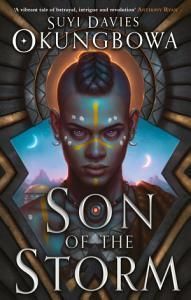
Son of the Storm
Award-winning author Suyi Davies Okungbowa begins a thrilling new epic fantasy series of violent conquest, buried histories and forbidden magic. In the city of Bassa, Danso is a clever scholar on the cusp of achieving greatness-only he doesn't want it. Instead, he prefers to chase forbidden stories about what lies outside the city walls. The Bassai elite claim there is nothing of interest. The city's immigrants are sworn to secrecy. But when Danso stumbles across a warrior wielding magic that shouldn't exist, he's put on a collision course with Bassa's darkest secrets. Drawn into the city's hidden history, he sets out on a journey beyond its borders. But the chaos left in the wake of his discovery threatens to destroy the empire. 'Everything I love to see in a fantasy story: masterful, fully-realised worldbuilding, morally complex characters, thoughtful and piercing interrogations of power, privilege, and all the facets of human nature. Damn good stuff!' - Jenn Lyons 'A mesmerising coming of age tale set against a thrilling, fantastical adventure that introduces and beguiling new world . . . and then rips apart everything you think you know' - S. A. Chakraborty 'An elaborately plotted tale of ancient magics and world-shattering politics. I, like many others, will be impatiently waiting for the next instalment!' - Andrea Stewart 'One of the most promising new voices in the growing coterie of African SFF writers' - Wired
Reviews
Amie ONeill@amieeereadsss
Monae Reads@lifeasmonae
Jennifer@vivaldi
Eva@evamaren
Lauren James@storiedadventures
C. D’Orsay @ankhanu
Deborah Kerr@debbie
Sophia @phiabia
Kevin Long@kevinuulong
Prashanth Srivatsa@prashanthsrivatsa
Laura Ladwig@lala
Kirsten Adam@kcs_adam
Merry@merrium
Joni@joni221
Meagan@meaganreads
Highlights
Sophia @phiabia
Page 337
Sophia @phiabia
Page 34